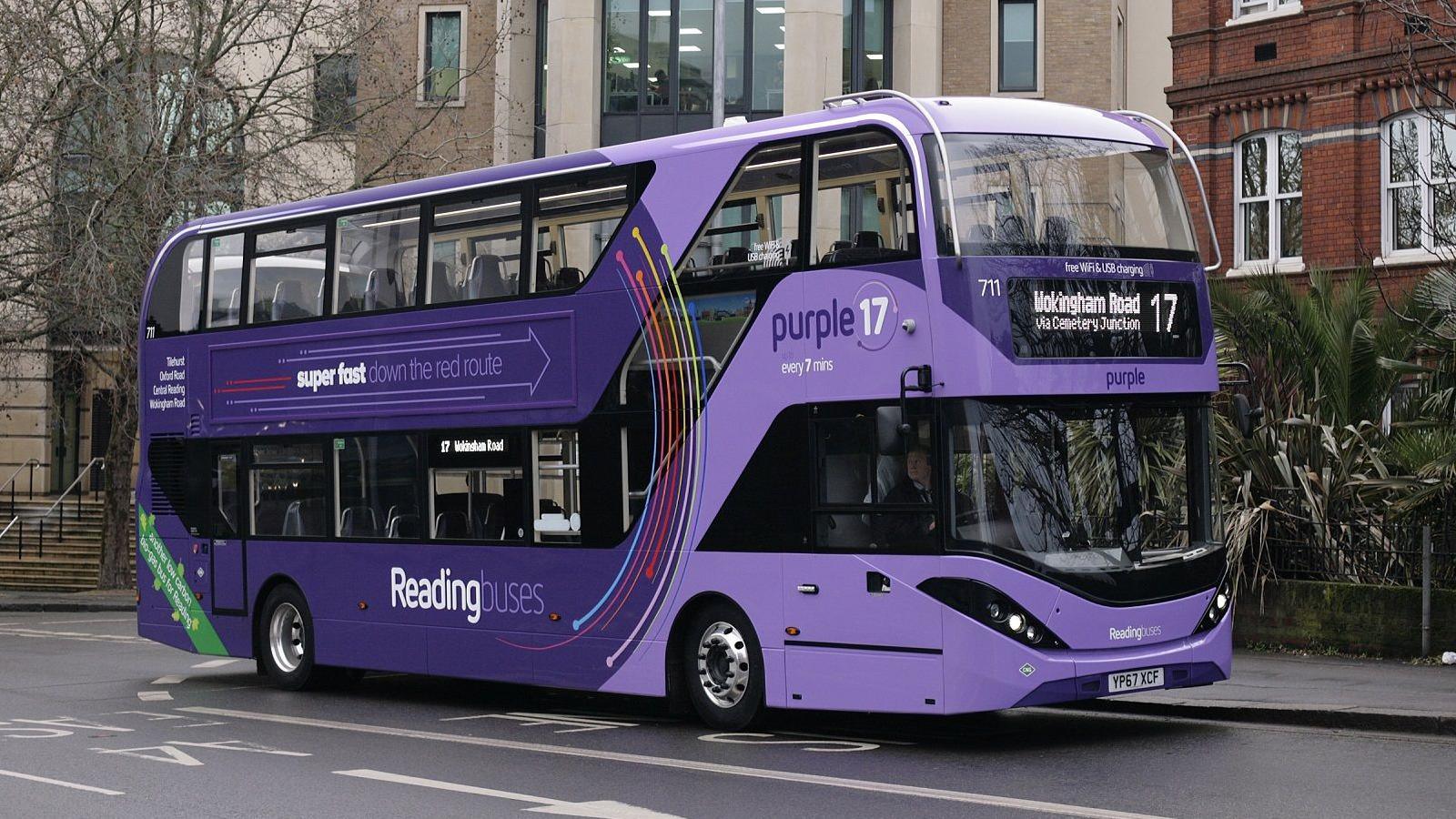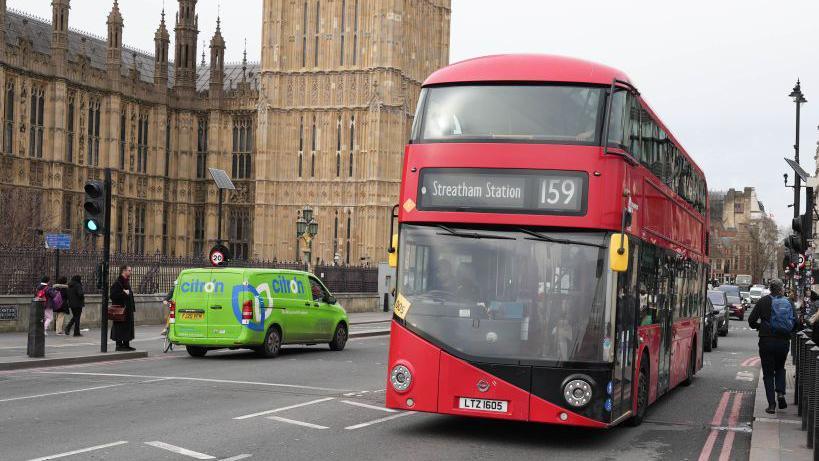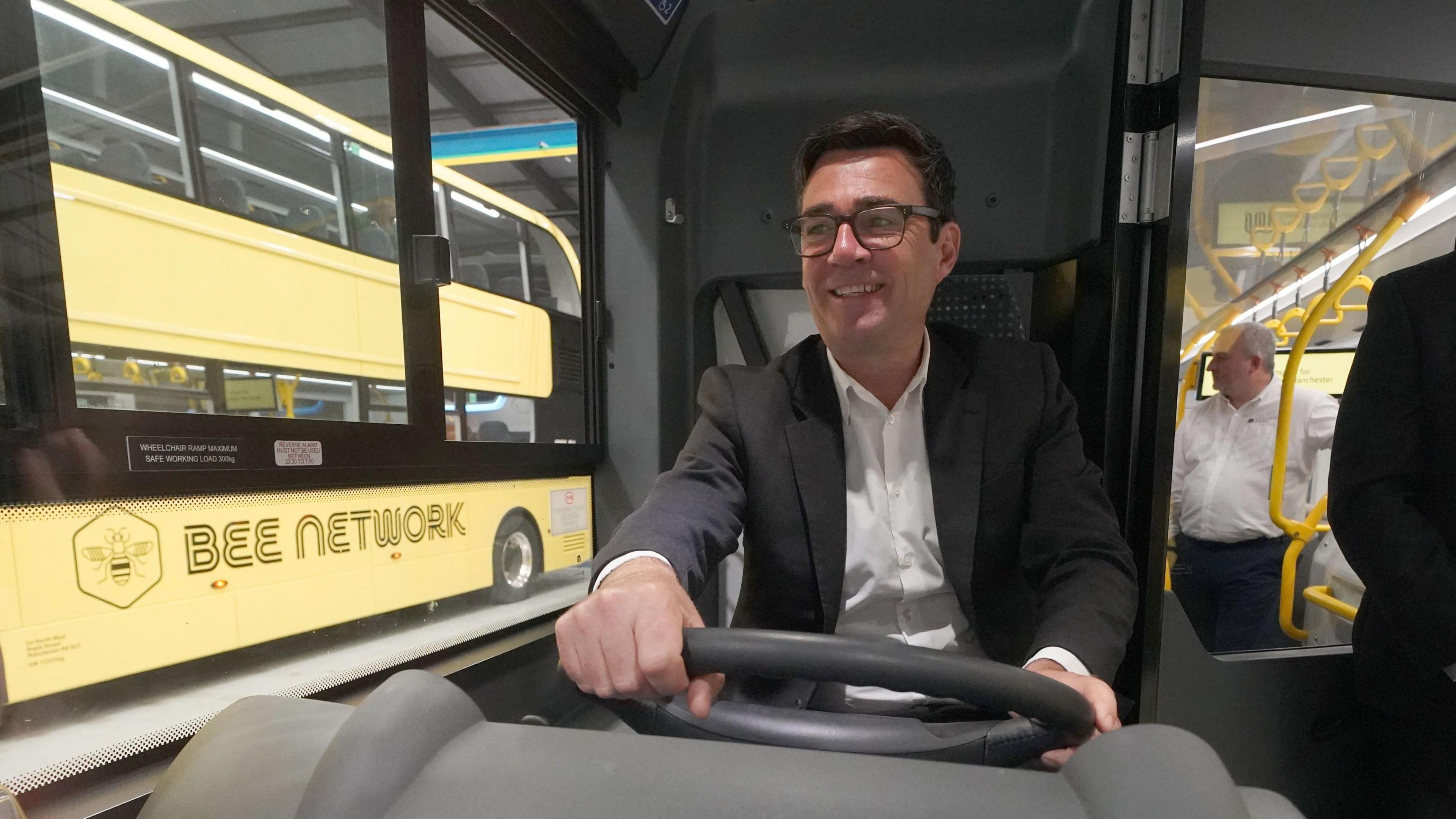What happens when councils take control of buses?

- Published
Buses are the most commonly used form of public transport in England - yet in recent years routes have been disappearing at an alarming rate.
Outside of London, bus services have dropped by 50% since 2008, according to research by Friends of the Earth, external, with people on lower incomes and those without a car disproportionately affected.
Bus use plummeted during the pandemic but even before then it was steadily declining in areas outside the capital.
One area bucking the national trend is Reading. The town - 40 miles to the west of London - was hit by Covid restrictions like everywhere else but the number of journeys on local bus services had been on the rise before the pandemic too.
Reading is one of only five areas in England where the local bus company is owned by the council.
Robert Williams, the chief executive of Reading Buses, says it means profits can be reinvested into services.
“We're able to take a longer term view, we're not constantly being chased to make sure our profit margin is a certain level, because our brief is just to provide the best possible service we can,” he says.
“You have local people that live and breathe the area, running the services and working out what should happen. It's not a central head office, hundreds of miles away.”
It also means that if the council puts money into things like bus lanes it sees a direct return - better services, more passengers and higher revenue from fares which can then be reinvested.
An extra £3m a year goes into the town's bus network because it does not pay out dividends to private shareholders, according to campaign group We Own it.
The council says this means it has been able to invest in one of the most environmentally friendly bus fleets in the country, including 66 bio-gas powered and 24 electric buses.
Is franchising the future of buses?
- Published24 March 2024
The UK’s hidden bus crisis – seen from the number 16
- Published22 October 2022
Until the 1980s most bus services were delivered through publicly owned companies, often run by councils, but in 1986 services outside London were deregulated and privatised, leading to the mass sale of council bus companies.
In London a franchising system was introduced, with Transport for London deciding routes, timetables and fares and operators bidding to run services for a fixed fee.
This has contributed to the capital seeing an increase in bus use, with services less hit by cuts, in contrast to other parts of the country.
In 2017 metropolitan mayors in England were given powers to introduce bus franchising but at the same time councils were banned from setting up their own bus companies from scratch.
If it wins power, Labour says it would give all areas the same opportunity to introduce franchising as metro mayors, as well as allowing councils and regional mayors to set up their own bus companies.
Mr Williams is a supporter of the council-owned model but has doubts over how easy it would be to replicate this more widely.
“You have to be able to afford to buy a depot, buy the vehicles, employ the people,” he says. “Setting that up from scratch is no quick job.”
In Reading, he points out, the council has owned the local bus company for more than 100 years.
Labour claims its plans would require no additional central government funding.
But Mr Williams is sceptical over whether councils, which are facing huge financial challenges, have the money to set up their own bus companies at the moment.
To improve services, he says, also requires investment.
In Reading, he says bus services get very little subsidy from the council as it benefits from its location as a busy commuter town.
“If we tried to replicate this in the middle of the countryside, we clearly wouldn't be able to sustain the same kind of network,” he adds.

Buses in London run under a franchise system
Paul Swinney, director of research and policy at the Centre for Cities think tank, says there are easier ways to achieve the benefits of greater control over bus services than full public ownership.
If a company is publicly owned, it is the taxpayer that is taking on the risk if it goes bust, he points out.
Instead, the think tank supports expanding the franchising system which is in place in London and has also been adopted in Greater Manchester.
Liverpool City Region, West Yorkshire and South Yorkshire are set to follow suit.
Mr Swinney says under a franchise model councils and mayors still have control over bus routes and can ensure these are integrated into a cohesive network with other forms of public transport like trains.
They can also keep hold of fares and choose to subsidise less profitable routes which are still vital for certain groups.
Although he says this won’t necessarily make single journeys cheaper, it is easier to bring in daily caps across the whole network.
The only difference to full public ownership is that it is private companies running the services.
Mr Swinney says past experience shows some level of public subsidy will still be necessary.
In London, for example, the tube generates surplus revenue which is used to subsidise buses, which run at a loss.
Other options for councils include generating money through congestion charges or parking levies.

Greater Manchester's "Bee Network" was launched by mayor Andy Burnham last year
Mr Swinney also believes funding would be needed to set up new franchise models.
Greater Manchester Combined Authority calculated it would cost £134.5m to bring the region’s buses under public control and has made use of central government funding as part of its devolution deal to pay for this.
The process has been implemented in phases and is due to be completed in 2025 but Labour mayor Andy Burnham says there have been immediate improvements including more frequent buses, later and earlier services and better connections to trains and trams.
Transport for Greater Manchester says the latest data shows its buses are now more reliable, with passenger numbers up.
However, not everyone has been won over by the idea of greater public control of buses.
During the recent mayoral campaign, then-West Midlands Conservative mayor Andy Street attacked his Labour opponent’s plan to take buses back under public control, saying the party had not said where the money to do this would come from.
Labour's Richard Parker, who won the contest, has pledged to build a "London-style integrated transport network" to make buses more affordable, reliable and frequent.
In Reading, being owned by the council has not made the bus services immune from the challenges facing other parts of the country.
It suffered from a drop in commuters during the pandemic and with the rise of working from home, the number of people travelling by bus to the train station to get into London has been hit.
“That just highlights the risks that goes with running a bus company,” Mr Williams says.
“Anything can affect your passenger numbers, whether it's in your control or outside. If councils get it wrong or put out the wrong service level or don't get the growth they're expecting, the taxpayer has got to pay for that.”